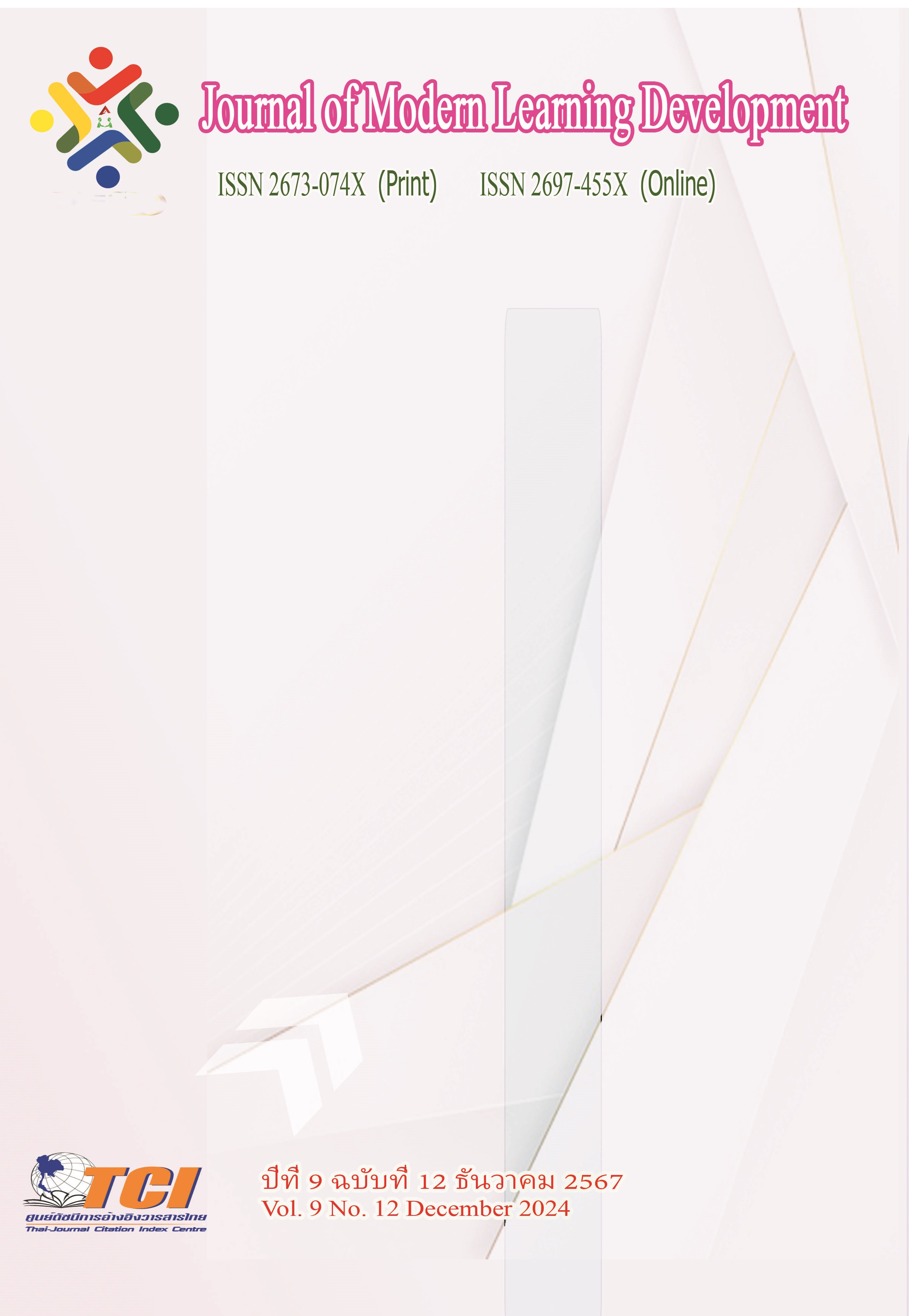Results of promoting learning potential of third year Early Childhood Education students by group process
Main Article Content
Abstract
This research is experimental. The objectives are: 1) study the academic achievement of students in organizing science and mathematics activities for early childhood children using the group process and 2) study the satisfaction of students with teaching and learning using the group process. The sample group used in the research is 50 students in the Early Childhood Education Program who study organizing science and mathematics activities for early childhood children in the first semester of the academic year 2023. They were obtained by cluster random sampling using the classroom as the sampling unit. The instruments used are the cooperative learning activity plan using the group process and the satisfaction questionnaire on teaching and learning using the group process. The statistics used for data analysis are the mean and standard deviation.
The results of the study found that the Academic results of students who received cooperative teaching with a group process Academic results were excellent at 24.00 percent, very good at 34.00 percent, and good at 42.00 percent in terms of student satisfaction the teaching was managed in a cooperative format with the group process divided into areas as follows: In terms of organizing learning activities it promotes collaboration at the highest level with the population mean μ = 4.66, SD=0.55 in terms of teaching and learning atmosphere students are enthusiastic about learning with the population mean μ = 4.64, SD=0.59 in terms of benefits received, there was the population mean μ = 4.56, SD=0.64 and in terms of content, making it possible to remember content and be able to search for knowledge on your own, there was the population mean μ = 4.52, SD=0.57 with the population mean for all aspects μ = 4.60, SD =0.59
Article Details
References
ทาระเนตร์, รักพร ดอกจันทร์ และอภิสิทธิ์ ภคพงศ์พันธุ์. (2560). การพัฒนาผลสัมฤทธิ์ทางการเรียนคณิตศาสตร์ เรื่องความน่าจะเป็น โดยการจัดการเรียนการสอนเน้นกระบวนการกลุ่มสำหรับนักเรียนชั้นมัธยมศึกษาปีที่ 5 โรงเรียนสา จังหวัดน่าน. ประชุมวิชาการเสนอผลงานวิจัยบัณฑิตศึกษาระดับชาติและนานาชาติ 2560 มหาวิทยาลัยขอนแก่น.
ทิศนา แขมมณี. (2545). ศาสตร์การสอน: องค์ความรู้เพื่อการจัดกระบวนการเรียนรู้ที่มีประสิทธิภาพ. (พิมพ์ครั้งที่ 2). กรุงเทพฯ: สานักพิมพ์จุฬาลงกรณ์มหาวิทยาลัย.
______. (2550). กลุ่มสัมพันธ์เพื่อการทำงานทีมและการจัดการเรียนการสอน. กรุงเทพฯ: สานักพิมพ์แห่งจุฬาลงกรณ์มหาวิทยาลัย.
นิภาพร ศรีสุภาพ. (2550). การพัฒนากิจกรรมการเรียนรู้แบบร่วมมือ เรื่อง พลเมืองดีตามวิธีประชาธิปไตย กลุ่มสาระสังคมศึกษา ศาสนา และวัฒนธรรมชั้นมัธยมศึกษาปีที่ 3. การค้นคว้าอิสระ กศ.ม.มหาสารคาม: มหาวิทยาลัยมหาสารคาม
นพเกล้า ศรีมาตย์กุล. (2557). ผลของการใช้เทคนิคการสอนแบบแบ่งกลุ่มย่อยที่มีต่อผลสัมฤทธิ์ทางการเรียนและความพึงพอใจของนักศึกษาในรายวิชา DES111 ทัศนศิลป์ 1 สาขาดิจิทัลอาร์ตส์ คณะดิจิทัลมีเดีย มหาวิทยาลัยศรีปทุม. วิทยานิพนธ์ปริญญามหาบัณฑิต มหาวิทยาลัยศรีปทุม.
บูรชัย ศิริมหาสาคร. (2545). แผนการสอนที่เน้นผู้เรียนเป็นศูนย์กลาง. กรุงเทพมหานคร : บุ๊คพอยท์.
ปรียาพร วงศ์อนุตรโรจน์. (2549). การบริหารงานวิชาการ. กรุงเทพฯ: ศูนย์สื่อเสริมกรุงเทพมหานคร.
ปียะมาศ ชาติมนตรี. (2550). การพัฒนาแผนการจัดการเรียนรู้ด้วยกระบวนการกลุ่มแบบร่วมมือ โดยใช้สวนพฤกษศาสตร์ ชั้นมัธยมศึกษาปีที่ 1. ปริญญานิพนธ์มหาบัณฑิต มหาวิทยาลัยอุบลราชธานี.
พรภัทร สินดี. (2557). ผลการจัดการเรียนรู้แบบบูรณาการเชิงวิธีการที่เน้นกระบวนการกลุ่มที่มีต่อผลสัมฤทธิ์ทางการเรียนวิชาคณิตศาสตร์ ความสามารถในการสื่อสารทางคณิตศาสตร์และพฤติกรรมการทำงานกลุ่มเรื่องลำดับและอนุกรมของนักเรียนชั้นมัธยมศึกษาปีที่ 5. วิทยานิพนธ์ปริญญามหาบัณฑิต มหาวิทยาลัยศรีนครินทรวิโรฒ.
วัฒนาพร ระงับทุกข์. (2554). เทคนิคและกิจกรรมการเรียนรู้ที่เน้นผู้เรียนเป็นสำคัญ. กรุงเทพฯ: พริกหวานกราฟฟิค.
ลักษณสุภา บังบางพลู. (2554). ผลสัมฤทธิ์การเรียนรู้รายวิชาการประมวลผลการวิจัยทางธุรกิจด้วยคอมพิวเตอร์โดยใช้กระบวนการกลุ่มในการจัดการเรียนการสอน. วิทยานิพนธ์ปริญญามหาบัณฑิตมหาวิทยาลัยราชภัฏสวนดุสิต.
ล้วน สายยศ และอังคณา สายยศ. (2552). เทคนิคการวิจัยทางการศึกษา. (พิมพ์ครั้งที่ 4). กรุงเทพฯ: สุวิริยาสาส์น.
สำนักงานมาตรฐานผลิตภัณฑ์อุตสาหกรรม. “กระบวนการกลุ่ม”. สืบค้น 10 กรกฎาคม 2566 จาก http//www.agro.ku.ac.th.
สุริยะ หาญพิชัย. (2561). การพัฒนาผลสัมฤทธิ์ทางการเรียนโดยใช้การเรียนรู้แบบร่วมมือด้วยกระบวนการกลุ่มในรายวิชากลยุทธ์การวางแผนพัฒนาท้องถิ่นเชิงบูรณาการ. วารสารวิชาการคณะมนุษยศาสตร์และสังคมศาสตร์. ปีที่ 9 (1), 15-26
อำนวย เดชชัยศรี, และคณะ. (2539). กระบวนการกลุ่ม. กรุงเทพมหานคร : โรงพิมพ์ศาสนา.
Slavin, R.E. (1990). Cooperative Learning: Research and Practice. Englewood Cliffs, NJ:Prentice Hall.


